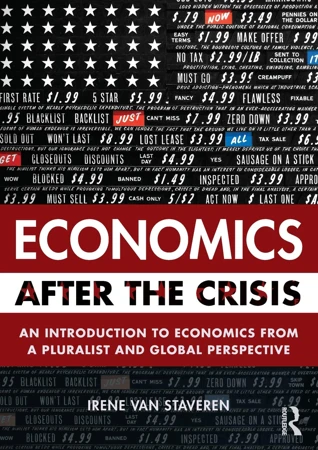Economics After the Crisis – An Introduction to Economics from a Pluralist and Global Perspective

Blurb
Economics After the Crisis is an introductory economics textbook, covering key topics in micro and macro economics. However, this book differs from other introductory economics textbooks in the perspective it takes, and it incorporates issues that are presently underserved by existing textbooks on the market. This book offers an introduction to economics that takes into account criticisms of the orthodox approach, and which acknowledges the role that this largely Western approach has played in the current global financial and economic crisis.
A key feature of the book is its global approach: it offers examples from countries all over the world, including from developing and emerging economies. The chapters discuss all major economic topics, including individuals and households; the behaviour of consumers; the behaviour of firms; markets; the role of the state; public goods and commons; labour markets; capital markets; the macroeconomic flow; economic growth; international trade; nature and environmental externalities; poverty and wellbeing. Throughout, the book presents theoretical perspectives in which social structures, relatedness, uncertainty, and social norms provide key economic explanations, contrasting these with the idealized worldview of neoclassical economics.
Economics After the Crisis is designed for a one-semester introductory course in economics, primarily at undergraduate but also at postgraduate level, and is suitable for students from a range of disciplines. It will be of particular relevance to those students with an interest in developing economies.
https: //www.coursera.org/learn/economicsfromapluralistperspective

